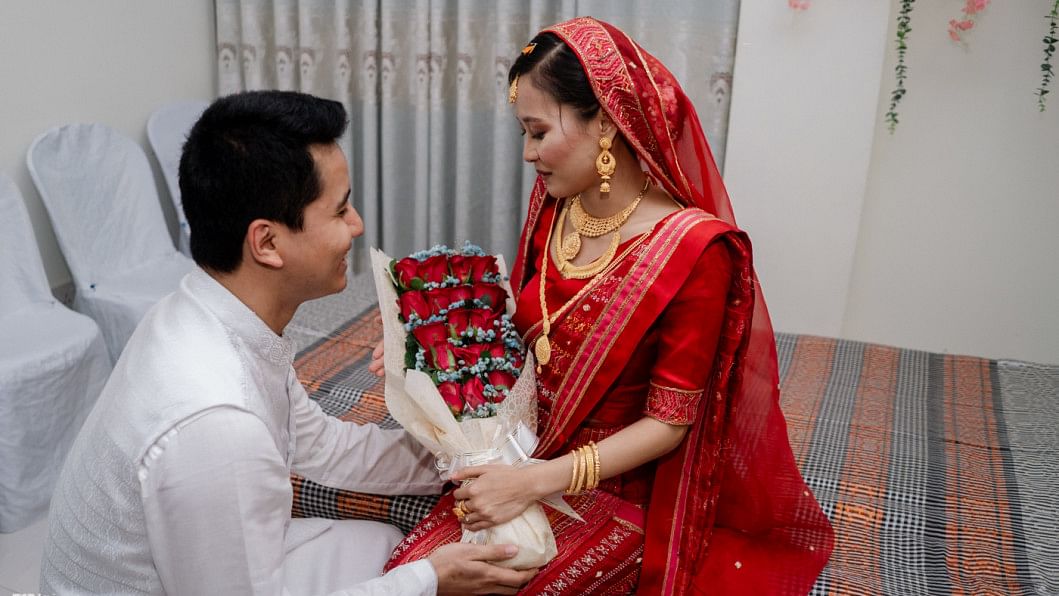Born and bred as a city boy, I was moulded by the bustling streets and towering high rises of Dhaka. Despite the comfort zones provided to me at an early age, I was always drawn to the unknown that exists outside the box. Following such an inclination, I ventured recently into the heart of Rangamati, a region renowned for its rich cultural tapestry, to witness a traditional Chakma wedding. What unfolded was not just a ceremony but a vibrant celebration of love, community, and tradition offering a mesmerising glimpse into a world I never knew existed.
The Journey Begins
The experience, narrated by Sugata Chakma, a respected elder and researcher, started with a journey akin to a pilgrimage. "The entire function and the subsequent ceremonies are truly a wonderful and wholesome process to witness," Sugata had remarked. True to his words, the wedding journey began with the groom's family waking early and traversing through hills to reach the bride's home, their arms laden with gifts.
The Rituals of Union
This journey was the first of three crucial visits, each marked by unique rituals. The first was about initiating conversations and seeking the bride's consent — a respectful tradition emphasising the importance of mutual agreement. The second visit delved deeper into the lives of the bride and groom, a testament to the thoroughness with which these unions are considered. Sugata went on, "Its significance comes from a deep-rooted cultural perspective."
The third visit set the stage for the wedding with the exchange of clothes and silver coins, symbolising the formal proceedings' commencement. The intricate details and the symbolism behind each step were a revelation to me, a city guy used to the straightforwardness of urban life.

A Day of Cultural Splendour
The wedding day was a spectacle of traditions. "Both parties bathing in the river, purifying themselves with special herbs and leaves," as Sugata described, marked the beginning of the day. Both the bride and groom are later blessed by the elders of the family with grains of rice, wishing them a lifetime of happiness. The groom's family setting up pots filled with water at their gate and the planting of banana plants were rituals steeped in symbolism, a far cry from the ways of the city of Dhaka.

The Blend of Tradition and Modernity
The bride, adorned in traditional dresses and ornaments, was a sight to behold. The departure of the bride from her family home was both joyous and tearful, reflecting the deep emotional bonds within these communities. While tradition dictated a return on foot with music and celebrations, modernity has blended in, with vehicles now part of the procession.

The Heart-warming Conclusion
The most heart-warming tradition unfolded at the groom's home. The "Agpani Kum Tulana" ceremony, involving a river ritual with flowers and lamps was particularly poignant. Sugata's description of the couple being bound together amidst playful chants would bring a smile to anyone's face.
The ceremony concluded with the couple feeding each other, symbolising their union. Sugata's narrative brought to life the depth of these rituals, "gathering blessings from all their elders and superiors before stepping into their newly married life."

Reflections of a City Guy
As the celebrations concluded, I found myself reflecting on the experience. In the heart of Rangamati, I discovered a world where tradition breathes and thrives, where community and culture intertwine seamlessly. It was not just a wedding; it was a lesson in cultural depth, emotional bonds, and the beauty of traditions that have stood the test of time.
This trip into the centre of Rangamati is not only a cultural experience but also a reminder of the rich fabric that is our world, a tapestry that is as alive and timeless as the Rangamati hills themselves.
Photo: Ata Mohammad Adnan / Reminiscence Photography
Bride: Upama, Groom: Auntik
Wardrobe: Sozpodor by Tenzing Chakma
Special Thanks to Sugata Chakma





Comments